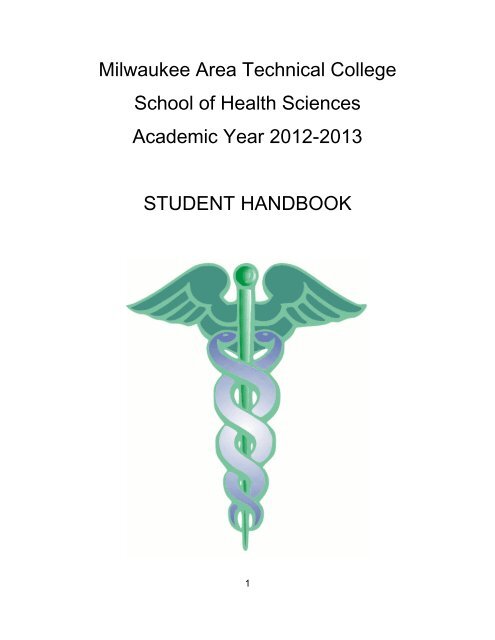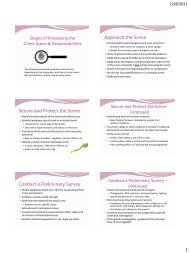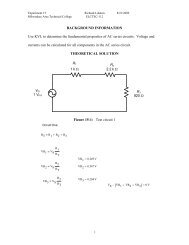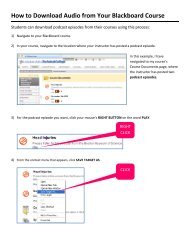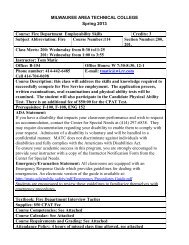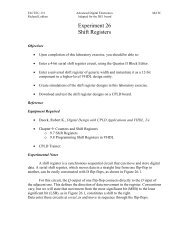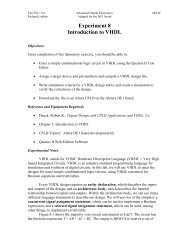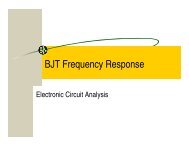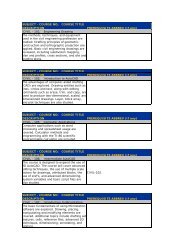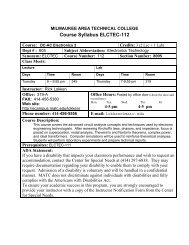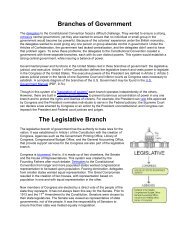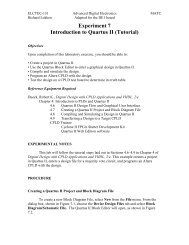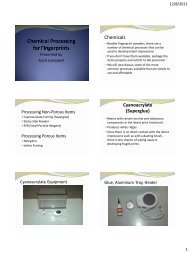Student Handbook - Welcome to MATC - Milwaukee Area Technical ...
Student Handbook - Welcome to MATC - Milwaukee Area Technical ...
Student Handbook - Welcome to MATC - Milwaukee Area Technical ...
You also want an ePaper? Increase the reach of your titles
YUMPU automatically turns print PDFs into web optimized ePapers that Google loves.
<strong>Milwaukee</strong> <strong>Area</strong> <strong>Technical</strong> College<br />
School of Health Sciences<br />
Academic Year 2012-2013<br />
STUDENT HANDBOOK<br />
1
Equal Opportunity And<br />
Affirmative Action Commitment<br />
<strong>Milwaukee</strong> <strong>Area</strong> <strong>Technical</strong> College’s (<strong>MATC</strong>) commitment <strong>to</strong><br />
equal opportunity in admissions, education programs, and<br />
employment policies assures that all individuals are included in<br />
the diversity that makes the college an exciting institution. <strong>MATC</strong><br />
does not discriminate against qualified individuals.<br />
2
TABLE OF CONTENTS<br />
PREFACE ............................................................................................. 7<br />
<strong>Welcome</strong> ............................................................................................... 8<br />
SECTION 1 – INTRODUCTION ............................................................ 9<br />
<strong>Milwaukee</strong> <strong>Area</strong> <strong>Technical</strong> College Vision ............................................. 9<br />
<strong>Milwaukee</strong> <strong>Area</strong> <strong>Technical</strong> College Mission .......................................... 9<br />
School of Health Sciences Mission ....................................................... 9<br />
<strong>Student</strong> Outcomes Assessment in School of Health Sciences .............. 9<br />
Core Abilities ......................................................................................... 10<br />
Health Sciences Programs .................................................................... 11<br />
SECTION 2 – SCHOOL OF HEALTH SCIENCES ADMINISTRATIVE<br />
AND SUPPORT PERSONNEL....................................... 13<br />
Quick Phone Reference ........................................................................ 15<br />
SECTION 3 – ACADEMIC PERFORMANCE ........................................ 18<br />
Academic Requirements ....................................................................... 18<br />
Auditing ..............................................................………………………… 19<br />
Advanced Standing ............................................................................... 19<br />
Grade Appeal Procedures ..................................................................... 20<br />
Attendance Procedures ......................................................................... 20<br />
Excessive Absenteeism ........................................................................ 20<br />
Course Syllabus or Manual Expectations .............................................. 21<br />
Conduct................................................................................................. 21<br />
Classroom/Clinical/Field Placement Conduct ........................................ 22<br />
Online/Blackboard <strong>Student</strong>s .................................................................. 23<br />
Standards for Academic Success (SAS) ............................................... 24<br />
3
SECTION 4 – CLINICAL/FIELD PLACEMENT ..................................... 27<br />
Clinical/Field Placement Assignments ............................................. 27<br />
Dress Code ..................................................................................... 27<br />
Transportation <strong>to</strong> Clinical/Field Placement ...................................... 28<br />
Ethical and Professional Clinical/Field Placement Conduct ............. 28<br />
Health Requirements ....................................................................... 29<br />
Hepatitis B Vaccine ......................................................................... 29<br />
Drug Testing .................................................................................... 30<br />
CPR Certification ............................................................................. 30<br />
Wisconsin Caregiver Background Checks ....................................... 30<br />
SECTION 5 – HEALTH INSURANCE PORTABILITY AND ACCOUNTABILITY<br />
ACT (HIPAA) .................................................................. 33<br />
Introduction <strong>to</strong> HIPAA ...................................................................... 33<br />
Protected Health Information ........................................................... 33<br />
Using and Disclosing PHI for Training Purposes Only ..................... 33<br />
De-identified Information ................................................................. 34<br />
Safeguarding PHI ............................................................................ 35<br />
Disclosure of PHI <strong>to</strong> Caregivers ....................................................... 36<br />
E-mailing PHI .................................................................................. 36<br />
Requests for Access/Copies of Medical Records ............................ 36<br />
Requests for PHI by Law Enforcement ............................................ 36<br />
Failure <strong>to</strong> Follow <strong>MATC</strong> Policies Governing PHI.............................. 36<br />
Confidentiality Agreement ............................................................... 37<br />
SECTION 6 – COURSE REPEAT & PROGRAM READMISSION .......<br />
PROCEDURES .............................................................. 38<br />
Course Repeat Procedure ............................................................... 38<br />
Out of Sequence………………………………………………………… 39<br />
Medical and Military Withdrawals……………………………………… 39<br />
Program Ineligibility……………………………………………………... 39<br />
Program Readmission Procedure .................................................... 39<br />
4
Academic Suspension ..................................................................... 41<br />
SECTION 7 – STUDENT HEALTH AND SAFETY ................................ 42<br />
Accidents – Clinical/Field Placement Agencies/College .................. 42<br />
Accidental Exposures ...................................................................... 43<br />
Latex Allergy .................................................................................... 43<br />
Disclaimer………………………………………………………………… 44<br />
Placement Release……………………………………………………… 45<br />
Liability Insurance ............................................................................ 45<br />
<strong>MATC</strong> School of Health Sciences Drug Testing and Electronic<br />
Health Record Tracking Policy………………………………………… 45<br />
Safety……………………………………………………………………… 46<br />
SECTION 8 – STUDENT RIGHTS, RESPONSIBILITIES AND RESOURCES…….. 47<br />
<strong>Student</strong> Rights and Responsibilities ................................................ 47<br />
Citizenship ....................................................................................... 47<br />
Fair and Equal Treatment ................................................................ 47<br />
<strong>Student</strong> Concerns/Issues ................................................................ 47<br />
Harassment/Discrimination .............................................................. 48<br />
Americans With Disabilities Act (ADA) ............................................ 49<br />
Disability Services/ <strong>Student</strong> Accommodation Services .................... 49<br />
Medical Conditions/Pregnancy…………………………………………. 50<br />
Counseling ...................................................................................... 51<br />
Tu<strong>to</strong>ring ........................................................................................... 51<br />
Academic Advising……………………………………………………… 51<br />
Employment Development Center ................................................... 52<br />
Code of Conduct ............................................................................. 52<br />
SECTION 9 – GRADUATION REQUIREMENTS AND PROCEDURES…. 53<br />
Graduation Requirements/Procedures ............................................ 53<br />
Pinning……………………………………………………………………. 53<br />
5
SECTION 10 – MISCELLANEOUS…………………………… ................ 54<br />
Field Trips........................................................................................ 54<br />
School Closings/Cancellation of Classes ......................................... 54<br />
Prior Approval <strong>to</strong> Transfer Core Courses from another<br />
Wisconsin <strong>Technical</strong> College District <strong>to</strong> <strong>MATC</strong> ……………………… 55<br />
<strong>Student</strong> Sign-Off Page ..................................................................... 59<br />
6
PREFACE<br />
The purpose of this reference manual is <strong>to</strong> provide each student<br />
in the School of Health Sciences with a guide <strong>to</strong> specific<br />
procedures/practices in their Health Sciences program(s). Since<br />
these programs involve the safe care and welfare of patients,<br />
there are certain standards of achievement which must be<br />
maintained. These procedures relate <strong>to</strong> those standards.<br />
7
2012-2013<br />
<strong>Welcome</strong> <strong>to</strong> the School of Health Sciences. As the 2012-2013 academic year begins, we<br />
look forward <strong>to</strong> your participation in many theory, simulation, and clinical/field<br />
placement experiences. Keep in mind that in order for your experiences <strong>to</strong> be<br />
memorable, you will need <strong>to</strong> fully commit and apply yourself <strong>to</strong> your Health Sciences<br />
courses. The <strong>MATC</strong> faculty and staff are eager <strong>to</strong> assist you during your learning<br />
journey.<br />
This handbook contains the rules, guidelines and procedures for your academic and<br />
clinical/field placement courses. I ask that you refer <strong>to</strong> this handbook electronically, or<br />
download it for your future reference.<br />
You are invited <strong>to</strong> visit the Dean’s office for assistance with your academic<br />
acknowledgements, challenges, and concerns. Our student services specialist, associate<br />
deans, staff, and I are eager <strong>to</strong> assist you.<br />
We look forward <strong>to</strong> a wonderful, productive, and most of all, successful academic year.<br />
Sincerely,<br />
Dessie Levy<br />
Dessie Levy<br />
Dr. Dessie Levy, PhD, MSN, RN, APNP<br />
Dean – School of Health Sciences<br />
Allied Health, Dental, and Nursing Programs<br />
8
SECTION 1 – INTRODUCTION<br />
MILWAUKEE AREA TECHNICAL COLLEGE VISION<br />
<strong>MATC</strong> is a premier, comprehensive technical college that provides excellence in<br />
education <strong>to</strong> enrich, empower and transform lives in our community.<br />
MILWAUKEE AREA TECHNICAL COLLEGE MISSION<br />
As a public, two-year comprehensive technical college, <strong>MATC</strong> offers quality<br />
educational and training opportunities and services <strong>to</strong> its diverse, metropolitan<br />
community by collaborating with partners <strong>to</strong> advance the lives of its students.<br />
SCHOOL OF HEALTH SCIENCES MISSION<br />
The School of Health Sciences provides quality educational experiences that enrich and<br />
empower students for service in healthcare through collaboration with community<br />
partners.<br />
STUDENT OUTCOMES ASSESSMENT IN SCHOOL OF HEALTH SCIENCES<br />
The School of Health Sciences administration and faculty are committed <strong>to</strong> the<br />
common goal of fulfilling the <strong>MATC</strong> Mission. A central focus of our commitment is<br />
centered around faculty believing that one of the best ways <strong>to</strong> improve teaching is <strong>to</strong><br />
focus on student learning. This belief is being applied throughout the division in a<br />
collective process known as <strong>Student</strong> Outcomes Assessment (SOA’s).<br />
As a student, you will experience outcomes assessment on a regular basis in your<br />
various courses. You will also play a critical role in assessing the entire program<br />
during your final semester of study. In the future, you may again be requested <strong>to</strong><br />
provide information as program alumni. Your input <strong>to</strong> this process is key <strong>to</strong> making<br />
our outcomes assessment process effective and worthwhile for students, faculty, the<br />
college and the community.<br />
9
CORE ABILITIES<br />
The <strong>MATC</strong> Core Abilities are the general skills, abilities, and attitudes that are<br />
essential for every successful graduate. They are broad, common abilities that<br />
students must possess <strong>to</strong> be prepared for the workforce. They have been called<br />
employability skills, soft skills, and professional attributes. <strong>MATC</strong> Core Abilities are:<br />
1. Communicate Effectively<br />
2. Collaborate with Others<br />
3. Respect Diversity<br />
4. Demonstrate Responsibility<br />
5. Think Critically and Creatively<br />
6. Utilize Technology<br />
7. Apply Math and Science<br />
8. Demonstrate Environmental Responsibility<br />
9. Embrace Change<br />
One of the goals of the School of Health Sciences is <strong>to</strong> prepare students <strong>to</strong> live and<br />
work in a continuously changing world by emphasizing student development and<br />
hands-on learning. Through experiences both in and out of the classroom, you’ll be<br />
given the opportunity <strong>to</strong> broaden your horizons and be challenged in ways that<br />
encourage the development of these Core Abilities vital <strong>to</strong> succeeding in life.<br />
You will find these core abilities within each course. Core Abilities are different than<br />
course competencies in that they are not course-specific. They are not taught in<br />
“lessons.” Instead, they are broader skills that run through courses and lessons.<br />
Core Abilities enable learners <strong>to</strong> perform competently.<br />
10
HEALTH SCIENCES PROGRAMS<br />
Allied Health Programs<br />
Anesthesia Technology – Associate Degree<br />
Cardiovascular Technology – Associate Degree<br />
Clinical Labora<strong>to</strong>ry Technician – Associate Degree<br />
Dietetic Technician – Associate Degree<br />
Funeral Services – Associate Degree<br />
Healthcare Services Management – Associate Degree<br />
Health Unit Coordina<strong>to</strong>r – <strong>Technical</strong> Diploma<br />
Medical Assistant – <strong>Technical</strong> Diploma<br />
Medical Coding – <strong>Technical</strong> Diploma<br />
Medical Interpreter – <strong>Technical</strong> Diploma<br />
Nursing Assistant – <strong>Technical</strong> Diploma<br />
Nursing Assistant, Bilingual (Spanish) – <strong>Technical</strong> Diploma<br />
Occupational Therapy Assistant – Associate Degree<br />
Optician-Vision Care – <strong>Technical</strong> Diploma<br />
Pharmacy Technician – <strong>Technical</strong> Diploma<br />
Phlebo<strong>to</strong>my – <strong>Technical</strong> Diploma<br />
Physical Therapist Assistant – Associate Degree<br />
Radiography – Associate Degree<br />
Renal Dialysis Technician – <strong>Technical</strong> Diploma<br />
Respira<strong>to</strong>ry Therapist – Associate Degree<br />
Surgical Technology – Associate Degree<br />
11
Dental Health Programs<br />
Dental Assistant – <strong>Technical</strong> Diploma<br />
Dental Assistant, Bilingual (Spanish) – <strong>Technical</strong> Diploma<br />
Dental Hygiene – Associate Degree<br />
Dental Technician – <strong>Technical</strong> Diploma<br />
Nursing Programs<br />
Practical Nursing – <strong>Technical</strong> Diploma<br />
LPN - RN Educational Progression – Associate Degree<br />
Registered Nursing – Associate Degree<br />
12
SECTION 2 – SCHOOL OF HEALTH SCIENCES<br />
ADMINISTRATIVE AND SUPPORT PERSONNEL<br />
MAILING ADDRESS:<br />
<strong>Milwaukee</strong> <strong>Area</strong> <strong>Technical</strong> College<br />
School of Health Sciences<br />
700 West State Street<br />
<strong>Milwaukee</strong>, WI 53233<br />
PHONE NUMBERS<br />
Main office for Health Sciences (414) 297-6263<br />
FAX for Health Sciences (414) 297-6851<br />
DEAN:<br />
Dessie Levy, PhD, MSN, RN, APNP<br />
Allied Health/Dental/Nursing Programs<br />
ASSOCIATE DEANS:<br />
Sharon Abs<strong>to</strong>n-Coleman PhD, MT (ASCP)<br />
Dental Assistant<br />
Dental Assistant, Bilingual<br />
Dental Technician<br />
Dental Hygiene<br />
Clinical Labora<strong>to</strong>ry Technician<br />
Health Unit Coordina<strong>to</strong>r<br />
Healthcare Services Management<br />
Medical Assistant<br />
Medical Interpreter<br />
13
Occupational Therapy Assistant<br />
Pharmacy Technician<br />
Phlebo<strong>to</strong>my<br />
Physical Therapist Assistant<br />
Richard Ammon, EdD<br />
Anesthesia Technology<br />
Cardiovascular Technology<br />
Health Cross Courses (Health 101, 104, 105, 107, 160, 308)<br />
Dietetic Technician<br />
Funeral Services<br />
Optician-Vision Care Program<br />
Radiography<br />
Respira<strong>to</strong>ry Therapist<br />
Surgical Technology<br />
Nancy Vrabec, PhD, RN<br />
LPN – RN Educational Progression<br />
Practical Nursing<br />
Registered Nursing<br />
Medical Coding<br />
Nursing Assistant<br />
Nursing Assistant, Bilingual (Spanish)<br />
Renal Dialysis<br />
Marietta Love, MS, <strong>Student</strong> Service Specialist<br />
School of Health Sciences, Down<strong>to</strong>wn <strong>Milwaukee</strong> Campus<br />
14
QUICK PHONE REFERENCE<br />
ACADEMIC SUPPORT CENTER<br />
<strong>Milwaukee</strong> Campus (414) 297-7324<br />
Mequon Campus (262) 238-2220<br />
Oak Creek Campus (414) 575-4647<br />
West Allis (414) 456-5334<br />
ALLIED HEALTH<br />
Dennis Schmidt, Department Chair (414) 297-7142<br />
ANESTHESIA TECHNOLOGY<br />
Erwin Wuehr, Program Coordina<strong>to</strong>r (414) 297-8517<br />
BLACKBOARD<br />
<strong>MATC</strong> Helpdesk (414) 297-6541<br />
CARDIOVASCULAR TECHNOLOGY<br />
Erwin Wuehr, Program and Clinical Coordina<strong>to</strong>r (414) 297-8517<br />
CLINICAL LAB TECHNICIAN<br />
Dennis Schmidt, Program Coordina<strong>to</strong>r (414) 297-7142<br />
James Man<strong>to</strong>, Clinical Coordina<strong>to</strong>r (414) 297-7139<br />
DENTAL ASSISTANT<br />
Deborah Smith, Program Coordina<strong>to</strong>r (414) 297-8197<br />
DENTAL ASSISTING, BILINGUAL<br />
Norma Cordova, Program Coordina<strong>to</strong>r (414) 297-6580<br />
DENTAL HYGIENE<br />
Kathi O’Meara, Department Chair (414) 297-7122<br />
Mary Peters-Wojnowiak, Clinical Coordina<strong>to</strong>r (414) 297-7120<br />
DENTAL TECHNICIAN<br />
Christine Freese, Program Coordina<strong>to</strong>r (414) 297-7133<br />
DIETETIC TECHNICIAN<br />
Rachel Hughes, Program Coordina<strong>to</strong>r (414) 456-5480<br />
15
EMERGENCY RESPONSE CENTER (DISTRICT) (414) 297-6200<br />
EMPLOYMENT DEVELOPMENT CENTER<br />
<strong>Milwaukee</strong> Campus (414) 297-6244<br />
FUNERAL SERVICES<br />
John Pludeman, Program and Clinical Coordina<strong>to</strong>r (414) 456-5320<br />
Michael Cornelius, Program Coordina<strong>to</strong>r (414) 456-5319<br />
HEALTH UNIT COORDINATOR (414) 297-8569<br />
Rebecca Garcia-Sanchez, Program Coordina<strong>to</strong>r (414) 297-7163<br />
HEALTHCARE SERVICES MANAGEMENT<br />
Rebecca Garcia-Sanchez, Program Coordina<strong>to</strong>r (414) 297-7163<br />
MEDICAL ASSISTANT<br />
Chris<strong>to</strong>pher Jack, Program Coordina<strong>to</strong>r (414) 297-6628<br />
Linda Brand, Clinical Coordina<strong>to</strong>r (414) 297-7075<br />
MEDICAL CODING<br />
Catherine Bell, Program Coordina<strong>to</strong>r (262) 238-2256<br />
MEDICAL INTERPRETER<br />
Rodney Ramos, Program Coordina<strong>to</strong>r (414) 297-6336<br />
NURSING ASSISTANT<br />
Mario Rojas, Department Chair (414) 297-8631<br />
OCCUPATIONAL THERAPY ASSISTANT<br />
Susan Heitman, Program Coordina<strong>to</strong>r (414) 297-6882<br />
Elaine Strachota, Clinical Coordina<strong>to</strong>r (414) 297-7160<br />
ONLINE CLASSES<br />
Distance Learning Staff (414) 297-7986<br />
PHARMACY TECHNICIAN<br />
Cynthia Steffen, Program Coordina<strong>to</strong>r (414) 297-7135<br />
PHLEBOTOMY<br />
Dennis Schmidt, Program Coordina<strong>to</strong>r (414) 297-7142<br />
16
PHYSICAL THERAPIST ASSISTANT<br />
Paul Mansfield, Program and Clinical Coordina<strong>to</strong>r (414) 297-8078<br />
PRACTICAL NURSING<br />
Rosemary Erkins, Program Coordina<strong>to</strong>r (414) 297-7213<br />
RADIOGRAPHY<br />
Patricia Winters, Program Coordina<strong>to</strong>r (414) 297-7155<br />
Paul Geibl, Clinical Coordina<strong>to</strong>r (414) 297-6679<br />
REGISTERED NURSING<br />
Mark Carranza , Campus Coordina<strong>to</strong>r (Mequon) (262) 238-4118<br />
Nancy Kron, Department Chair (414) 297-7192<br />
Kathy Costa-Lieberthal, Clinical Coordina<strong>to</strong>r (414) 297-6782<br />
RENAL DIALYSIS<br />
Jill Shumpert, Program Coordina<strong>to</strong>r 414 297-6728<br />
RESPIRATORY THERAPIST<br />
Dwayne Schlund, Program Coordina<strong>to</strong>r (414) 297-7128<br />
Lisa Gustafson, Clinical Coordina<strong>to</strong>r (414) 297-7131<br />
SURGICAL TECHNOLOGY<br />
Pat Staple<strong>to</strong>n, Program and Clinical Coordina<strong>to</strong>r (414) 297-7151<br />
WEATHER CLOSINGS<br />
<strong>Milwaukee</strong> Campus (414) 297-6561<br />
NOTE: Channel 10/36 is the only official source for school closings<br />
17
SECTION 3 – ACADEMIC PERFORMANCE<br />
ACADEMIC REQUIREMENTS<br />
Because Health Sciences programs involve the care and welfare of people, the<br />
grade of “C” or its equivalent is the minimum grade accepted in many Health<br />
Sciences courses. Some programs require a minimum grade of C+ in all technical<br />
courses. For many Associate Degree programs, NATSCI courses (Natural Science)<br />
must be completed with a grade of “B-“ or better before being admitted <strong>to</strong><br />
clinical/field placement courses. Refer <strong>to</strong> your program plan.<br />
If the minimum grade is not achieved, the final grade for the course is rated<br />
“Unsatisfac<strong>to</strong>ry,” and the entire course must be repeated. The course syllabi detail<br />
the academic rules specific <strong>to</strong> each course. Grades in all Health Sciences courses<br />
are determined as follows:<br />
Refer <strong>to</strong> Section 7 - Course Repeat and Program Readmission<br />
Procedures<br />
A = 94% — 100%<br />
A- = 92% — 93%<br />
B+ = 89% — 91%<br />
B = 85% — 88%<br />
B- = 83% — 84%<br />
C+ = 80% — 82%<br />
C = 77% — 79%<br />
Below 77% = Unsatisfac<strong>to</strong>ry<br />
Passing requirements may vary by program, be sure <strong>to</strong><br />
consult the course syllabus.<br />
18
Please Note: Natural Science courses (or challenge examinations) must have been<br />
completed within five years of the start of technical courses. Some programs require<br />
that technical courses are completed within a designated time period. See the<br />
appropriate associate dean for information.<br />
AUDITING<br />
The numbers of individuals auditing any one course may be limited as determined by<br />
program faculty. <strong>Student</strong>s must have the permission of the dean, associate dean,<br />
and course instruc<strong>to</strong>r <strong>to</strong> audit a course(s) in a Health Sciences program. Permission<br />
will only be granted before the start of a course. In cases where demand for a<br />
course exceeds class size limitations, preference will be given <strong>to</strong> credit students over<br />
audi<strong>to</strong>rs. <strong>Student</strong>s are not permitted <strong>to</strong> audit any clinical/field placement courses.<br />
As audi<strong>to</strong>rs, students will not be required <strong>to</strong> complete out-of-class assignments and<br />
examinations; however, fees and attendance requirements are identical <strong>to</strong> those of<br />
credit students. Audited courses may not be used <strong>to</strong> satisfy course prerequisites or<br />
required courses. Not all courses can be audited.<br />
Current policies of external agencies do not allow financial aid or veterans benefits<br />
for audited courses. In cases where demand for a course exceeds class size<br />
limitations, preference will be given <strong>to</strong> credit students over audi<strong>to</strong>rs.<br />
ADVANCED STANDING<br />
Individual programs have criteria for Advanced Standing. Contact the department<br />
chair or program coordina<strong>to</strong>r for details.<br />
19
GRADE APPEAL PROCEDURES<br />
<strong>Student</strong>s may initiate a grade appeal when they believe a grade was not calculated<br />
or determined in accordance with the current course syllabus. All grade appeals will<br />
follow the procedure detailed in the <strong>MATC</strong> <strong>Student</strong> <strong>Handbook</strong>.<br />
ATTENDANCE PROCEDURES<br />
Regular and punctual attendance is required. Instruc<strong>to</strong>rs will inform students of<br />
attendance requirements and will take attendance on a daily basis. It is the<br />
responsibility of the student <strong>to</strong> discuss absences with their instruc<strong>to</strong>rs when they<br />
occur.<br />
EXCESSIVE ABSENTEEISM<br />
A student may be dropped for excessive absenteeism whenever the course<br />
instruc<strong>to</strong>r determines it is no longer possible for the student <strong>to</strong> meet the course<br />
objectives. The instruc<strong>to</strong>r will counsel the student as soon as it becomes apparent<br />
that the student can no longer meet the course objectives in the remaining time. This<br />
applies <strong>to</strong> lecture, labora<strong>to</strong>ry, and off-campus clinical or field placement experiences<br />
Refer <strong>to</strong> the attendance requirements in each course syllabus.<br />
When a student’s consecutive absences exceed the number of<br />
class meetings per week, or on the third consecutive absence in<br />
the case of classes which meet once each week, the instruc<strong>to</strong>r<br />
may withdraw the student from the course. Instruc<strong>to</strong>rs must<br />
withdraw a student who misses three consecutive weeks.<br />
When student attendance is sporadic, the instruc<strong>to</strong>r will determine whether the<br />
student is able <strong>to</strong> make up the work missed without hindering the instruction of the<br />
other students in the class.<br />
20
In addition, the instruc<strong>to</strong>r may withdraw a student for any of the following reasons:<br />
1) <strong>Student</strong> fails <strong>to</strong> meet attendance requirements of licensing agencies.<br />
2) <strong>Student</strong> poses a safety hazard <strong>to</strong> him/herself or others because of missed<br />
instruction critical <strong>to</strong> safe class or lab performance.<br />
3) <strong>Student</strong> is unable <strong>to</strong> make up instruction missed in a lab/shop class.<br />
4) <strong>Student</strong> has not attended class during the first week of the term<br />
COURSE SYLLABUS OR COURSE MANUAL EXPECTATIONS<br />
<strong>Student</strong>s will receive a course syllabus or course manual at the beginning of each<br />
Health Sciences program/course. The syllabus or manual informs the student of the<br />
guidelines relevant <strong>to</strong> each particular course. The syllabus or manual includes<br />
information regarding the objectives of the course, specific health requirements (if<br />
applicable), attendance, attire, conduct, methods of testing, and methods of grading<br />
<strong>to</strong> satisfy the objectives of the course. The instruc<strong>to</strong>r reviews the syllabus or manual<br />
and provides either a hard copy or web-link <strong>to</strong> the students on the first day of class.<br />
In case of absence on the first day of class, it is the student’s responsibility <strong>to</strong> obtain<br />
the syllabus or manual from the instruc<strong>to</strong>r and <strong>to</strong> retain the syllabus or manual<br />
throughout the course.<br />
CONDUCT<br />
School of Health Sciences students are expected <strong>to</strong> conduct themselves in a manner<br />
consistent with the standards governing their chosen profession. Disciplinary action<br />
may vary, and is dependent on the nature of the conduct, and may begin with<br />
suspension through permanent dismissal from the School of Health Sciences.<br />
• Suspension timelines can vary from one <strong>to</strong> two semesters at the discretion<br />
of the dean or designee for the program.<br />
• Program dismissals are permanent.<br />
21
The following are examples of (but not limited <strong>to</strong>) unethical conduct that could lead <strong>to</strong><br />
disciplinary action:<br />
1) Plagiarizing or submitting another person’s academic work as one’s own.<br />
This includes another student’s work, as well as reference material.<br />
2) Cheating. This includes, but is not limited <strong>to</strong>; revealing test content <strong>to</strong><br />
another student or receiving such information prior <strong>to</strong> taking an exam, in<br />
addition <strong>to</strong> sharing information, unauthorized use of technology, referring<br />
<strong>to</strong> notes, texting, pho<strong>to</strong>graphy, etc., during or after an exam, quiz.<br />
3) Displaying disruptive, violent, and/or abusive behavior in the classroom or<br />
at the clinical/field placement site.<br />
4) Possession of and/or use of alcohol or other drugs.<br />
5) Improper or unsafe use of prescription drugs or over-the-counter<br />
medications.<br />
6) The inability <strong>to</strong> safely perform duties related <strong>to</strong> functional impairment.<br />
7) Possession of firearms or other weapons.<br />
8) Cyber-bullying.<br />
9) Inappropriate use of social medial related <strong>to</strong> HIPAA, FERPA, and ADA.<br />
CLASSROOM/CLINICAL/FIELD PLACEMENT DO’S AND DON’TS<br />
Do’s<br />
1) <strong>Student</strong>s will dress professionally as defined in the course syllabus.<br />
2) <strong>Student</strong>s will conduct themselves at all times in a professional manner,<br />
and will refrain from loud, boisterous, offensive or otherwise inappropriate<br />
language or conduct.<br />
3) <strong>Student</strong>s will abide by all policies, rules and regulations established by<br />
<strong>Milwaukee</strong> <strong>Area</strong> <strong>Technical</strong> College and the healthcare facility where<br />
assigned for clinical/field placement course work. When a student fails <strong>to</strong><br />
22
do so, <strong>Milwaukee</strong> <strong>Area</strong> <strong>Technical</strong> College or the healthcare facility has the<br />
right <strong>to</strong> dismiss the student from the site.<br />
Don’ts<br />
1) <strong>Student</strong>s are not permitted <strong>to</strong> bring children or guests <strong>to</strong> the<br />
classroom, labora<strong>to</strong>ry or clinical/field placement site.<br />
2) <strong>Student</strong>s are not allowed <strong>to</strong> use pagers or cellular telephones in the<br />
classroom, labora<strong>to</strong>ry, or clinical/field placement site.<br />
3) <strong>Student</strong>s are not permitted <strong>to</strong> smoke, eat, or drink in any class or<br />
clinical/field placement site unless authorized.<br />
4) Once dismissed from clinical/field placement coursework, the<br />
student is not permitted <strong>to</strong> return <strong>to</strong> <strong>Milwaukee</strong> <strong>Area</strong> <strong>Technical</strong><br />
College or the clinical/field placement site until authorized by<br />
<strong>Milwaukee</strong> <strong>Area</strong> <strong>Technical</strong> College.<br />
NOTE: <strong>Student</strong>s should also review <strong>MATC</strong>’s <strong>Student</strong> Code of Conduct:<br />
http://matc.edu/student/studentlife/upload/<strong>Student</strong>CodeofConduct.pdf<br />
ONLINE / BLACKBOARD STUDENTS<br />
If you have questions about how <strong>to</strong> use the Blackboard system of instruction, contact<br />
your instruc<strong>to</strong>r. If he/she is unable <strong>to</strong> assist you, contact the Helpdesk at <strong>Milwaukee</strong><br />
<strong>Area</strong> <strong>Technical</strong> College at (414) 297-6541.<br />
For online <strong>Student</strong>s, the Distance Learning staff at (414) 297-7986 can also assist<br />
you with specific online questions. If you have special needs, library or grading<br />
concerns, follow the instructions listed elsewhere in this handbook. Consult your<br />
online syllabus for grading standards and deadlines for submitting assignments.<br />
23
STANDARDS FOR ACADEMIC SUCCESS (SAS)<br />
(The following section was taken from the current <strong>MATC</strong> <strong>Student</strong> <strong>Handbook</strong>)<br />
Due <strong>to</strong> pending Federal Legislation changes, please refer <strong>to</strong> the most current<br />
information regarding <strong>MATC</strong> Standard’s of Academic Success at<br />
http://matc.edu/student/resources/financial_aid/index.cfm<br />
The <strong>MATC</strong> Standards of Academic Success and Financial Aid Eligibility define the<br />
requirements students must meet <strong>to</strong> maintain satisfac<strong>to</strong>ry academic progress and financial aid<br />
eligibility. They provide students who are having academic difficulties with a framework for<br />
knowing when assistance and specific support services are needed <strong>to</strong> ensure success in<br />
meeting their educational goals.<br />
In addition <strong>to</strong> explaining the appeal process, the Standards of Academic Success, also<br />
establish a formal process <strong>to</strong> identify, notify, and provide assistance <strong>to</strong> students who fall<br />
below required academic standards. They apply <strong>to</strong> all students enrolled in degree and<br />
diploma programs.<br />
<strong>MATC</strong> calculates students’ Academic Status three times each year: after the end of the fall,<br />
spring, and summer semesters. Grade changes and completion of incomplete grades will be<br />
calculated the following semester. This calculation includes:<br />
• Semester Grade Point Average (GPA) based on coursework completed at <strong>MATC</strong><br />
during the semester being evaluated<br />
• Cumulative GPA based on all coursework completed at <strong>MATC</strong><br />
• Semester course completion rate (percentage of credits completed out of credits<br />
attempted at <strong>MATC</strong> for the semester being evaluated)<br />
• Cumulative course completion rate – percentage of credits completed out of all<br />
credits attempted at <strong>MATC</strong>.<br />
After the calculation, students will be placed on good academic standing, academic warning,<br />
academic probation, or academic probation with moni<strong>to</strong>red academic plan. These students<br />
are financial aid eligible (Title IV Programs) as long as they can complete their academic<br />
program within the maximum timeframe of attempted credits.<br />
The maximum time frame is the period of time that is no longer than 150% of the length of<br />
the academic program. For example, the Registered Nursing associate degree program<br />
requires 70 credits <strong>to</strong> graduate. Total credits <strong>to</strong> graduate (70) multiplied by 150% is 105 in<br />
24
attempted credits. This means that the student must complete the program within the 105<br />
attempted credits <strong>to</strong> be eligible <strong>to</strong> receive financial aid. The 105 attempted credits include: all<br />
credits transferred <strong>to</strong> <strong>MATC</strong>, attempted credits, and completed credits at <strong>MATC</strong>.<br />
Good Academic Standing<br />
To remain in good Academic Standing, a student must maintain:<br />
• Minimum 2.0 Semester Grade Point Average<br />
• Minimum 2.0 Cumulative Grade Point Average<br />
• Minimum 67% Semester Course Completion Rate (U, W, and I grades are<br />
considered as credits attempted but not successfully completed)<br />
• Minimum 67% Cumulative Course Completion Rate (U, W, and I grades are<br />
considered as credits attempted but not successfully completed.)<br />
<strong>Student</strong>s may be eligible <strong>to</strong> receive Title IV and state financial aid while on good academic<br />
standing.<br />
Academic Warning (Financial Aid Warning)<br />
<strong>Student</strong>s who fail <strong>to</strong> meet the above requirements for good Academic Standing will have<br />
their status changed <strong>to</strong> Academic Warning and will receive written notification from the<br />
Registrar. The number of credits a student may take is not limited.<br />
<strong>Student</strong>s on Academic Warning will return <strong>to</strong> good Academic Standing when they meet both<br />
semester and cumulative standards. If students do not meet the standards <strong>to</strong> return <strong>to</strong> good<br />
standing, they will be placed on Academic Suspension.<br />
<strong>Student</strong>s cannot be on Academic Warning consecutively (two or more semesters in a row).<br />
<strong>Student</strong>s may not appeal their academic warning status.<br />
Academic Suspension (Financial Aid Suspension)<br />
<strong>Student</strong>s on Academic Warning placed on Academic Suspension will be notified by the<br />
Registrar of their change in status, the appeal procedures, and the deadlines <strong>to</strong> file an<br />
Academic Appeal for Reinstatement. All appeals must be in writing. The appeals review<br />
process includes a determination of financial aid eligibility.<br />
25
The first time a student is suspended and their appeal is granted, they will be placed on<br />
Academic Probation with or without financial aid. If a student is suspended two or more<br />
times and their appeal is granted, they will be placed on Academic Probation with Moni<strong>to</strong>red<br />
Plan with or without financial aid.<br />
<strong>Student</strong>s whose appeals are denied will be suspended from <strong>MATC</strong> for one semester. To be<br />
considered for reinstatement and financial aid eligibility, students must file an academic<br />
appeal by the deadline established by the Academic Appeals Committee.<br />
Academic Probation (Financial Aid Probation)<br />
<strong>Student</strong>s on Academic Probation will be limited <strong>to</strong> a maximum of six counselor-approved<br />
credits. The program counselor will serve as the advisor <strong>to</strong> students on academic/financial aid<br />
probation.<br />
<strong>Student</strong>s will return <strong>to</strong> good Academic Standing when they meet both the semester and the<br />
cumulative requirements.<br />
<strong>Student</strong>s cannot be on Academic Probation consecutively (two or more semesters in a row).<br />
Academic Probation with Moni<strong>to</strong>red Plan (Financial Aid Probation with Moni<strong>to</strong>red<br />
Plan)<br />
As a consequence of failing <strong>to</strong> meet the requirements <strong>to</strong> return <strong>to</strong> good Academic Standing,<br />
students on Academic Probation will be placed on Academic Suspension. <strong>Student</strong>s will need<br />
<strong>to</strong> appeal, and if the appeal process is granted, students will be placed on Academic Probation<br />
with Moni<strong>to</strong>red Plan and will be required <strong>to</strong> follow an academic plan that is developed by<br />
their program counselor. The plan will be moni<strong>to</strong>red each semester. Any deviation from the<br />
plan will result in suspension.<br />
<strong>Student</strong>s on this status must achieve a 2.0 semester Grade Point Average and a 100%<br />
semester completion rate <strong>to</strong> remain on this status and avoid returning <strong>to</strong> Academic and<br />
Financial Aid Suspension.<br />
<strong>Student</strong>s will return <strong>to</strong> Good Academic Standing when they meet both semester and<br />
cumulative requirements, as defined by the Standards for Good Academic Standing.<br />
26
SECTION 4 – CLINICAL/FIELD PLACEMENT<br />
CLINICAL/FIELD PLACEMENT ASSIGNMENTS<br />
Each Health Sciences program schedules clinical/field placement assignments in<br />
accordance with the approved number of course credits. The <strong>to</strong>tal hours are<br />
assigned following the college calendar. To ensure an appropriate and quality<br />
clinical/field placement experience, certain programs may schedule clinical/field<br />
placement hours evenings, weekends, and/or holidays.<br />
Certain changes are arising in the healthcare industry that might affect the<br />
availability of clinical and field placement sites. This availability could delay<br />
clinical/field placement and could extend the length of the student’s program.<br />
The need for additional personal background documentation (criminal and/or health<br />
related) prior and during clinical/field placement might also delay and/or prevent<br />
clinical/field placement. Clinical/Field placement will not be made if the student<br />
fails <strong>to</strong> meet these requirements.<br />
The clinical/field placement assignment schedule cannot accommodate students’<br />
work schedules, childcare plans, travel arrangements, or other personal matters.<br />
Because there are multiple fac<strong>to</strong>rs involved in preparing clinical/field placement<br />
schedules, requests for changes in assignments will not be honored except in<br />
EXTREME emergency situations.<br />
DRESS CODE<br />
<strong>Student</strong>s must comply with the dress code for the clinical/field placement site they are<br />
assigned <strong>to</strong>, including specific uniform requirements of the program. Tat<strong>to</strong>os and body<br />
piercings must be covered during clinical/field placement.<br />
27
TRANSPORTATION TO CLINICAL/FIELD PLACEMENT<br />
<strong>Student</strong>s are solely responsible for their transportation <strong>to</strong> and from any clinical/field<br />
placement site or agency. <strong>Student</strong>s must arrive on time.<br />
ETHICAL AND PROFESSIONAL CLINICAL/FIELD PLACEMENT CONDUCT<br />
Health Sciences students are expected <strong>to</strong> conduct themselves in a professional<br />
manner consistent with the standards governing their chosen profession and in<br />
accordance with the School of Health Sciences requirements for Academic, Ethical,<br />
and Professional Conduct. Examples of inappropriate conduct that could lead <strong>to</strong><br />
disciplinary action, up <strong>to</strong> and including dismissal from a Health Sciences program,<br />
include, but are not limited <strong>to</strong>: loud, boisterous, offensive or otherwise inappropriate<br />
language or conduct; direct communication with clinical/field placement facilities <strong>to</strong><br />
inquire regarding clinical/field placement processes, decisions or placement denials;<br />
attempts <strong>to</strong> make direct arrangements with clinical/field placement facilities for<br />
clinical/field placements.<br />
The following include, but are not limited <strong>to</strong>, further examples of unethical conduct<br />
that could result in suspension or permanent dismissal from a Health Sciences<br />
clinical/field placement experience, course, program, or division:<br />
1. Positive drug testing results at ANY point during a student’s Health<br />
Sciences program.<br />
2. Revealing confidential patient information <strong>to</strong> anyone, including the<br />
patient’s family members. See Section 6, regarding Health Insurance<br />
Portability and Accountability Act (HIPAA) requirements and confidentiality.<br />
3. Refusing <strong>to</strong> provide care <strong>to</strong> a patient because of the patient’s race, color,<br />
sex, religion, age, beliefs or disability.<br />
4. Abusing a patient physically or mentally by conduct such as striking a<br />
patient, improperly confining a patient, cursing at a patient, or arguing or<br />
cursing in the presence of a patient.<br />
28
5. Practicing beyond the scope of the student’s education, training or<br />
experience.<br />
6. Falsifying patient records or reports.<br />
7. Abusing alcohol and/or other drugs during class or at the clinical/field<br />
placement site.<br />
8. Failure <strong>to</strong> safeguard the patient from incompetent or unethical healthcare<br />
provided by another person. Such incidents are <strong>to</strong> be reported <strong>to</strong> the<br />
appropriate supervisor or instruc<strong>to</strong>r.<br />
9. Destroying or stealing property of the patients, other students’, affiliating<br />
agencies, clinical/field placement instruc<strong>to</strong>rs’ or clinical/field placement staff.<br />
HEALTH REQUIRENTS<br />
Admissions <strong>to</strong> a Health Sciences program is contingent upon completion and<br />
approval of health records as required for each program. This information can be<br />
found at http://matc.edu/health_sciences/index.cfm and clicking the appropriate<br />
program. Ongoing health requirements as determined by the particular program and<br />
clinical/field placement agency must be completed by a designated date in order <strong>to</strong><br />
enroll in the course of study and enter the clinical/field placement agency. Meeting<br />
the health requirements is the sole responsibility of the student. The “Health<br />
Certification Form,” also includes documentation of immunizations and completion of<br />
Essential Functions form (as outlined by the Americans with Disabilities Act).<br />
HEPATITIS B VACCINE<br />
Healthcare workers, including students, may be at a greater risk of contracting<br />
Hepatitis B than the general public due <strong>to</strong> exposure <strong>to</strong> patients who may be infected<br />
with the virus. For this reason, the School of Health Sciences STRONGLY<br />
recommends that all students discuss the risk of Hepatitis B infection with their<br />
personal healthcare provider and consider immunization.<br />
29
Information concerning Hepatitis B and the procedure for immunization will be given<br />
<strong>to</strong> all students during the orientation/registration process.<br />
DRUG TESTING<br />
<strong>Student</strong>s are required <strong>to</strong> undergo drug testing at his/her own expense at any point<br />
during the Health Sciences program. (Refer <strong>to</strong> the <strong>MATC</strong>-School of Health Sciences<br />
Drug Testing and Electronic Health Record Tracking Policy located on pages 42-43.)<br />
CPR CERTIFICATION<br />
<strong>Student</strong>s are responsible for maintaining current American Heart Association<br />
Healthcare Provider Level CPR certification (2 Year) as designated by the<br />
program. Refer <strong>to</strong> your program’s webpage for details. Please note: If<br />
certification expires, the entire CPR course must be retaken. Recertification courses<br />
are available through <strong>Milwaukee</strong> <strong>Area</strong> <strong>Technical</strong> College, local hospitals, clinics and<br />
community agencies. If taking an on-line course, the demonstration portion must be<br />
completed for certification.<br />
WISCONSIN CAREGIVER BACKGROUND CHECKS<br />
When you participate in a Health Sciences clinical/field placement course, you will<br />
have access <strong>to</strong> patients and/or their records. The Wisconsin’s Caregiver Law<br />
requires background and criminal his<strong>to</strong>ry checks of certain personnel who are<br />
responsible for the care, safety and security of children and adults. The law also<br />
requires covered entities <strong>to</strong> investigate and report incidents of misconduct (abuse,<br />
neglect or misappropriation of property). You will be required <strong>to</strong> fulfill the caregiver<br />
background check requirements prior <strong>to</strong> your participation in a <strong>MATC</strong> clinical or field<br />
placement course at a healthcare facility in the community.<br />
There are two forms <strong>to</strong> complete before your experience begins:<br />
1) “Release and Conditions of Criminal Background Check;” your signature<br />
on this form authorizes us <strong>to</strong> obtain your criminal background information<br />
30
and provide it <strong>to</strong> student clinical/field placement sites as required by the<br />
Wisconsin Caregiver law.<br />
2) “Background Information Disclosure Form,” (Department of Health<br />
Services Form F-82064A); a questionnaire including questions about<br />
criminal background, professional care-giving experiences, and state<br />
residencies.<br />
<strong>Milwaukee</strong> <strong>Area</strong> <strong>Technical</strong> College paralegal staff will use the information you<br />
provide from your Background Information Disclosure Form <strong>to</strong> perform single or<br />
combined searches <strong>to</strong> obtain criminal or misconduct information or any<br />
substantiated findings of abuse or neglect and license restrictions and denials from<br />
the following: Wisconsin Department of Justice; additional court systems as<br />
necessary, Wisconsin Department of Health Services; U.S. Department of Health &<br />
Human Services-Office of Inspec<strong>to</strong>r General and the Excluded Parties List System.<br />
If you already hold a license or certification in a healthcare discipline, you will be<br />
required <strong>to</strong> complete an electronic status check of professional licenses and<br />
credentials through the Department of Safety & Professional Services.<br />
Based on the information revealed by you on your background information<br />
disclosure form and/or results obtain through the electronic checks, you may be<br />
asked <strong>to</strong> provide additional documentation such as an out-of-state criminal his<strong>to</strong>ry<br />
search, relevant military records, and/or supplemental court records. <strong>Student</strong>s are<br />
required by the Wisconsin Caregiver Law <strong>to</strong> report <strong>to</strong> <strong>MATC</strong> and the<br />
clinical/field placement site, information on any new charges or convictions<br />
for a crime or other offense which occurred after having completed the initial<br />
criminal background check on the Background Disclosure Form. Failure <strong>to</strong><br />
make a complete and accurate disclosure may subject the student <strong>to</strong> a<br />
Wisconsin statu<strong>to</strong>ry fine of up <strong>to</strong> $1,000 and possible suspension or<br />
termination from courses conducted at off-campus healthcare sites.<br />
31
<strong>Student</strong>s are prohibited from direct communication with clinical/field placement<br />
facilities <strong>to</strong> inquire regarding clinical/field placement processes, decisions or<br />
placement denials. Non-compliance could lead <strong>to</strong> disciplinary action, up <strong>to</strong> and<br />
including dismissal from a Health Sciences program.<br />
In addition, licensing/certification agencies also require criminal background<br />
investigations. Applicants having questions in this area need <strong>to</strong> discuss this matter<br />
with the <strong>Student</strong> Service Specialist in Room S223, (414) 297-7498), or the associate<br />
dean of your program area. Additional information is available on the Wisconsin<br />
Department of Health Services website:<br />
http://www.dhs.wisconsin.gov/caregiver/index.htm<br />
Some offenses may bar you from working in the healthcare professions. This will<br />
depend on the date and type of offense(s). Such offenses will bar you from<br />
placements in field or clinical sites as part of your <strong>MATC</strong> educational program. If a<br />
placement site cannot be arranged for you as a result of your background<br />
check, you will not be able <strong>to</strong> complete or graduate from your chosen Health<br />
Sciences program. Advice with regard <strong>to</strong> other occupational programs will be<br />
provided.<br />
32
SECTION 5 – HEALTH INSURANCE PORTABILITY AND<br />
ACCOUNTABILITY ACT (HIPAA)<br />
INTRODUCTION TO HIPAA<br />
As a student in the School of Health Sciences, you are required <strong>to</strong> learn about the<br />
health information privacy requirements (“Privacy Rule”) of a federal law called<br />
Health Insurance Portability and Accountability Act (HIPPA).The purpose of this<br />
document is <strong>to</strong> summarize relevant <strong>MATC</strong> policies dealing with protecting patient’s<br />
health information.<br />
PROTECTED HEALTH INFORMATION<br />
The Privacy Rule defines how healthcare providers, staff in healthcare settings, and<br />
students in clinical training programs can access, use, disclose, and maintain<br />
confidential patient information called “Protected Health Information” (“PHI”). PHI<br />
includes written, spoken, and electronic information. PHI means any information that<br />
identifies a patient, by demographic, financial, and/or medical, that is created by a<br />
healthcare provider or health plan that relates <strong>to</strong> the past, present or future condition,<br />
treatment, or payment of the individual. The Privacy Rule very broadly defines<br />
“identifiers” <strong>to</strong> include not only patient name, address, and social security number,<br />
but also, for example, fax numbers, e-mail addresses, vehicle identifiers, URLs,<br />
pho<strong>to</strong>graphs, and voices or images on tapes or electronic media. When in doubt,<br />
you should assume that any individual’s health information is protected under<br />
HIPAA. The following lists ways in which you are permitted and prohibited from<br />
accessing, using, and disclosing PHI during clinical/field placement rotation at<br />
<strong>MATC</strong>.<br />
USING AND DISCLOSING PHI FOR TRAINING PURPOSES ONLY<br />
As a student in a clinical training program, you are permitted <strong>to</strong> access, use, and<br />
disclose PHI only as is minimally necessary <strong>to</strong> meet your clinical training needs (you<br />
are only accessing, using, or disclosing, the minimum amount of information needed<br />
33
for your training purposes). You are not permitted <strong>to</strong> disclose PHI <strong>to</strong> anyone outside<br />
of <strong>MATC</strong> or your training program, without first obtaining written patient authorization<br />
or de-identifying the PHI. This means that you may not discuss or present<br />
identifiable patient information with or <strong>to</strong> anyone, including classmates or<br />
faculty, who are not part of your training, unless you first obtain written<br />
authorization from the patient. Therefore, it is strongly recommended that<br />
whenever possible, you de-identify PHI (discussed below) before presenting any<br />
patient information outside <strong>MATC</strong>. If you are unable <strong>to</strong> de-identify such information,<br />
you must discuss your need for identifiable information with the faculty member<br />
supervising your training and the HIPAA Privacy Officer at your training site, <strong>to</strong><br />
determine the appropriate procedures for obtaining patient authorization for your use<br />
and disclosure of PHI.<br />
DE-IDENTIFIED INFORMATION<br />
In order for PHI <strong>to</strong> be considered “de-identified,” all of the following identifiers of the<br />
patient or of relatives, employers, or household members of the patient, must be<br />
removed:<br />
a. Name;<br />
b. Geographic subdivisions smaller than a state (i.e., county, <strong>to</strong>wn, or city,<br />
street address, and zip code) (note: in some cases, the initial three digits of a<br />
zip code may be used);<br />
c. All elements of dates (except year) for dates directly related <strong>to</strong> an<br />
individual (including birth date, admission date, discharge date, date of death,<br />
all ages over 89 and dates indicative of age over 89)<br />
d. Phone numbers;<br />
e. Fax numbers;<br />
f. E-mail addresses;<br />
g. Social security number;<br />
h. Medical record number;<br />
34
i. Health plan beneficiary number;<br />
j. Account number;<br />
k. Certificate/license number;<br />
l. Vehicle identifiers and serial numbers;<br />
m. Device identifiers and serial numbers;<br />
n. URLs;<br />
o. Internet pro<strong>to</strong>col addresses;<br />
p. Biometric identifiers (e.g., fingerprints);<br />
q. Full face pho<strong>to</strong>graphic and any comparable images;<br />
r. Any other unique identifying number, characteristic, or code; and<br />
s. Any other information that could be used alone or in combination with<br />
other information <strong>to</strong> identify the individual, such as a picture of a face<br />
SAFEGUARDING PHI<br />
Below are common sense steps <strong>to</strong> take <strong>to</strong> protect PHI when using it, such as:<br />
• When you see a medical record in public view where patients or others can<br />
see it, cover, file, turn it over or find another way <strong>to</strong> protect.<br />
• When discussing patient concerns as part of your training, prevent others<br />
from overhearing the conversation. Whenever possible, hold conversations in<br />
private.<br />
• When medical records are not in use s<strong>to</strong>re them in offices, shelves or filing<br />
cabinets.<br />
• Remove patient documents from faxes and copiers as soon as possible.<br />
• Discard documents containing PHI in <strong>MATC</strong> confidential bins for shredding.<br />
• Do not remove patient official medical records from the training site.<br />
• Log out of electronic systems containing PHI when you are done using<br />
them.<br />
35
DISCLOSURE OF PHI TO FAMILY OR FRIENDS INVOLVED IN PATIENT CARE<br />
Care must be taken when discussing PHI in front of or with a family member or<br />
friend who is involved in the care of the patient. Generally you can assume that the<br />
patient does not object <strong>to</strong> you talking about them with such a person, however, if you<br />
have any reason <strong>to</strong> believe that the patient would object (discussing a “sensitive”<br />
diagnosis or procedure, etc.) then you should either ask the person <strong>to</strong> step out of the<br />
room or ask the patient if it is okay <strong>to</strong> talk <strong>to</strong> that person.<br />
E-MAILING PHI OR TRANSMITTING PHI VIA SOCIAL MEDIA<br />
Because of potential security risks, you are not permitted <strong>to</strong> e-mail or transmit<br />
information via social media with PHI <strong>to</strong> anyone.<br />
REQUESTS FOR ACCESS OR COPIES OF MEDICAL RECORDS<br />
HIPAA grants patients the right <strong>to</strong> access <strong>to</strong> and obtain copies of their medical<br />
records. However, please refer all such requests <strong>to</strong> the patient’s primary health care<br />
provider (i.e., nurse) <strong>to</strong> ensure that proper procedures are followed.<br />
REQUESTS FOR PHI BY LAW ENFORCEMENT<br />
Requests for PHI by law enforcement officers (i.e., police, sheriff) must be referred <strong>to</strong><br />
the patient’s primary caregiver <strong>to</strong> ensure that proper procedures are followed.<br />
FAILURE TO FOLLOW <strong>MATC</strong> POLICIES GOVERNING PHI<br />
Failure <strong>to</strong> follow polices governing access <strong>to</strong>, and use and disclosure of PHI will<br />
result in being denied access <strong>to</strong> <strong>MATC</strong> facilities and clinical/field placement sites.<br />
Failure <strong>to</strong> follow polices governing access <strong>to</strong>, and use and disclosure of PHI might<br />
also result in civil and criminal penalties under federal law.<br />
36
CONFIDENTIALITY AGREEMENT<br />
<strong>Student</strong>s are required <strong>to</strong> sign a confidentiality agreement signifying that HIPAA<br />
regulations are unders<strong>to</strong>od and will be adhered <strong>to</strong> prior <strong>to</strong> participation in all<br />
clinical/field placement rotations.<br />
37
SECTION 6, COURSE REPEAT & PROGRAM READMISSION PROCEDURES<br />
COURSE REPEAT PROCEDURE<br />
Notification:<br />
A student, who receives an unsatisfac<strong>to</strong>ry “U” or withdrawal “W” final grade in a<br />
single technical course, and has no additional final grades of “U” or “W” among their<br />
technical courses, must complete the following forms:<br />
•<strong>Student</strong> Course Repeat Request Form<br />
• <strong>Student</strong> Academic Action Plan for Success Form<br />
Both forms must be submitted <strong>to</strong> the course instruc<strong>to</strong>r within ten (10)<br />
days of notification. The course instruc<strong>to</strong>r will sign both forms and<br />
s<strong>to</strong>re with program records. Forms may be obtained from the course<br />
instruc<strong>to</strong>r or the School of Health Sciences Administrative Office at<br />
your campus location.<br />
Course repeat readmission is based on space availability and<br />
program specific pro<strong>to</strong>cols.<br />
See: Section 3, Academic Performance; and Section 4, Clinical/Field<br />
Placement for examples of conduct and performance that might result in a<br />
student receiving an unsatisfac<strong>to</strong>ry “U” or withdrawal “W”.<br />
See: Standards for Academic Success (SAS) Policy - <strong>Milwaukee</strong> <strong>Area</strong><br />
<strong>Technical</strong> College <strong>Student</strong> <strong>Handbook</strong> at:<br />
http://matc.edu/student/studentlife/upload/2012-13_<strong>Student</strong>_<strong>Handbook</strong>.pdf<br />
38
OUT OF SEQUENCE<br />
<strong>Student</strong>s who fail or withdraw from a core technical course are considered, “out of<br />
sequence,” in the program. <strong>Student</strong>s out of sequence may be permitted <strong>to</strong> return <strong>to</strong><br />
the program based on space availability. A student who is out of sequence may not<br />
register for a program core technical course until all prerequisite courses are<br />
completed.<br />
MEDICAL AND MILITARY WITHDRAWALS<br />
Requests for readmission for medical or military reasons will be reviewed by the<br />
dean of the School of Health Sciences, or the dean’s designee.<br />
PROGRAM INELIGIBILITY<br />
A student, who receives an unsatisfac<strong>to</strong>ry “U” and/or a withdrawal “W” final grade<br />
twice in the same technical course or in two different technical courses is deemed<br />
“program ineligible” and will not be permitted <strong>to</strong> continue in the indicated Health<br />
Sciences program. After a student becomes “program ineligible” their program code<br />
will be deactivated by the program designee.<br />
It is the responsibility of the student <strong>to</strong> withdraw from continuing Health Sciences<br />
program courses he/she registered for, but is ineligible <strong>to</strong> take. A program ineligible<br />
student • who fails <strong>to</strong> withdraw from a paid program course, will receive and<br />
unsatisfac<strong>to</strong>ry (U) grade for the course. A program ineligible student who fails <strong>to</strong><br />
withdraw from an unpaid course, will be de-registered by the Registration Department<br />
PROGRAM READMISSION PROCEDURE<br />
Upon administrative approval, students may be readmitted once <strong>to</strong> the same Health<br />
Sciences program.<br />
The student seeking program readmission must apply as follows:<br />
<strong>Student</strong> Responsibility:<br />
• Complete a <strong>Student</strong> Program Readmission Request Form<br />
39
• Complete a <strong>Student</strong> Academic Action Plan for Success Form<br />
• Submit all Documents <strong>to</strong> the Health Sciences Administrative Office, room<br />
H116. (Forms may be obtained from the School of Health Sciences<br />
Administrative Office, room H116.)<br />
Divisional Process:<br />
• The Division Readmission Committee meets once during the fall and<br />
once during the spring semesters.<br />
• Division Readmission Committee will review the readmission packet, in<br />
addition <strong>to</strong> the student’s complete academic his<strong>to</strong>ry/profile/record.<br />
• Division Readmission Committee will mail written notice of the<br />
committee’s recommendation <strong>to</strong> the student within 60 days of the<br />
submission timeline (November 1 st or April 1 st ).<br />
• <strong>Student</strong>s granted program readmission are required <strong>to</strong> contact their<br />
program designee for information on registering for courses they need <strong>to</strong><br />
take. Enrollment is based on space availability. The academic<br />
performance of readmitted students will be moni<strong>to</strong>red <strong>to</strong> assess continued<br />
program eligibility.<br />
• <strong>Student</strong>s denied program readmission have the right <strong>to</strong> appeal the<br />
decision. The appeal must be submitted in writing <strong>to</strong> the associate dean of<br />
the program within 10-days of receipt of the denial letter.<br />
• After review of the appeal, the student will be mailed written notice, within<br />
ten (10) business days, of the final College decision.<br />
The Division Readmission Committee is comprised of Health Sciences faculty<br />
and administra<strong>to</strong>rs, and <strong>MATC</strong> counselors.<br />
40
ACADEMIC SUSPENSION<br />
<strong>Student</strong>s placed on Academic Suspension are not permitted <strong>to</strong> continue in a Health<br />
Sciences program. The student’s program code is deactivated by the Registrar’s<br />
Office. The student must meet with the respective program counselor for<br />
reinstatement instructions and information.<br />
See: Standards for Academic Success (SAS) Policy- <strong>Milwaukee</strong> <strong>Area</strong><br />
<strong>Technical</strong> College <strong>Student</strong> <strong>Handbook</strong> at:<br />
http://matc.edu/student/studentlife/upload/2012-13_<strong>Student</strong>_<strong>Handbook</strong>.pdf<br />
41
SECTION 7 – STUDENT HEALTH AND SAFETY<br />
ACCIDENTS – CLINICAL/FIELD PLACEMENT AGENCIES/COLLEGE<br />
<strong>Student</strong>s are responsible for reporting illness or accidents occurring at <strong>MATC</strong><br />
(lecture, labora<strong>to</strong>ry, and assigned clinical/field placement agencies) immediately <strong>to</strong><br />
their instruc<strong>to</strong>r and/or clinical/field placement supervisor/precep<strong>to</strong>r. Documentation<br />
shall include the required forms from the clinical/field placement agency as well as<br />
the college. Completed forms will be submitted <strong>to</strong> the <strong>MATC</strong> instruc<strong>to</strong>r. These<br />
forms are available in the administration office at each campus.<br />
<strong>Student</strong>s are responsible for complying with policies and procedures as well as<br />
standard operating procedures for maintaining their own safety. A clinical/field<br />
placement rotation in a hospital or clinic does not entitle the student <strong>to</strong> medical<br />
coverage beyond what is available in an ordinary educational setting. <strong>Student</strong>s are<br />
responsible for expenses incurred resulting from personal injury, accidents, or illness<br />
occurring while they are in <strong>MATC</strong> classrooms, clinical/field placement agencies, or<br />
en route <strong>to</strong> or from a clinical/field placement agency. <strong>Student</strong>s shall not engage in<br />
any behavior, task, or procedure that presents a risk <strong>to</strong> themselves or other health<br />
care practitioners without first obtaining appropriate instructions and procedures,<br />
including but not limited <strong>to</strong>, required personal protective equipment identified as the<br />
current clinical standard of practice.<br />
If you do not have current health care coverage, a personal health insurance<br />
policy is strongly recommended. Medical facilities used for clinical/field<br />
placement instruction may require proof of medical coverage. <strong>Student</strong> health<br />
insurance information is available through the Office of <strong>Student</strong> Life, Room<br />
S-303 on the <strong>Milwaukee</strong> Campus or at the other <strong>Student</strong> Life offices.<br />
42
ACCIDENTAL EXPOSURES<br />
Faculty members in each Health Sciences Program are responsible for ensuring that<br />
students receive adequate pre-clinical training and meet the minimal competency<br />
standards for clinical/field placement experiences as identified in their course syllabi.<br />
<strong>Student</strong>s are responsible for following the specific program guidelines, as well as the<br />
clinical/field placement agency guidelines, for the use and handling of biological<br />
materials, chemotherapeutic agents, and for exposure <strong>to</strong> blood and body fluids.<br />
Depending on the clinical/field placement agency and the nature of the incident, the<br />
student may be examined on site (urgent or emergency care) or be required <strong>to</strong> see<br />
his or her own health care provider. The student’s own health care provider is<br />
responsible for comprehensive or continuing medical care. The student is<br />
financially obligated for his or her own medical assessment and treatment.<br />
If the incident is associated with any accidental exposure <strong>to</strong> blood/body fluids<br />
including needle-stick injuries, the clinical/field placement agency procedures will be<br />
used <strong>to</strong> document, track, and analyze the injury/incident. All forms and<br />
documentation must be completed by the student in a timely manner and will be<br />
evaluated by the appropriate health care provider. Any accidental exposure incident,<br />
including needle sticks injuries, will require the clinical/field placement agency<br />
procedures <strong>to</strong> be followed.<br />
A <strong>MATC</strong> Accident Report form will be attached <strong>to</strong> the clinical/field placement<br />
agency documentation and report of outcomes. The <strong>MATC</strong> instruc<strong>to</strong>r is responsible<br />
for processing the forms.<br />
LATEX ALLERGY<br />
Frequent users of latex products may develop allergies <strong>to</strong> latex proteins resulting in<br />
allergic reactions, varying from mild <strong>to</strong> life-threatening. Health Sciences students use<br />
latex products, especially gloves, in compliance with standard precautions <strong>to</strong> prevent<br />
43
the spread of infection through blood and body fluids exposure. <strong>Student</strong>s with<br />
allergies/sensitization <strong>to</strong> latex and/or documented risk groups (a<strong>to</strong>pic or otherwise),<br />
as identified on the <strong>MATC</strong> Health Certification form, and the Essential Functions<br />
form, must be evaluated by their physician or healthcare provider.<br />
A complete and timely evaluation will be required of severely allergic students<br />
wishing <strong>to</strong> enter or continue in any Health Sciences program. The dean of the<br />
School of Health Sciences, collaborating with <strong>Student</strong> Accommodation Services and<br />
other program direc<strong>to</strong>rs, will make a determination if “reasonable accommodations”<br />
can be made for the student <strong>to</strong> meet the college’s core abilities, occupationally<br />
specific objectives, or <strong>to</strong> perform the functional abilities required in the occupationally<br />
specific area. Low-risk students, as well as those with a negative clinical his<strong>to</strong>ry of<br />
latex reactions, are not required <strong>to</strong> have extensive allergy testing prior <strong>to</strong> entering a<br />
Health Sciences program. However, students will be encouraged <strong>to</strong> seek evaluation<br />
by their physician/health care provider if symp<strong>to</strong>ms suggestive of latex sensitivity<br />
develop during their labora<strong>to</strong>ry/clinical/field placement instruction.<br />
DISCLAIMER<br />
<strong>Student</strong>s must adhere <strong>to</strong> prescribed safety measures and follow standard<br />
precautions when working with patients, blood, body fluids and tissue, either in the<br />
school labora<strong>to</strong>ry or in the clinical/field setting. Faculty cannot assume the<br />
responsibility for assigning students <strong>to</strong> work with blood, body fluids or tissue that are<br />
free from communicable diseases such as HIV, AIDS or hepatitis. It is the<br />
responsibility of the student <strong>to</strong> work safely and take the proper safety precautions <strong>to</strong><br />
minimize exposure <strong>to</strong> such diseases. <strong>Milwaukee</strong> <strong>Area</strong> <strong>Technical</strong> College, its faculty,<br />
or clinical/field placement agencies will NOT be held liable for accidents, injuries or<br />
infections incurred by students during their course of study.<br />
44
PLACEMENT RELEASE<br />
All students will be required <strong>to</strong> sign a Clinical/Field Placement Agreement and<br />
Release form, prior <strong>to</strong> starting their clinical/field placement. By signing this form the<br />
student acknowledges the potential risks of participating in clinical/field placement<br />
activities, and agrees <strong>to</strong> assume full responsibility for these risks.<br />
LIABILITY INSURANCE<br />
<strong>Milwaukee</strong> <strong>Area</strong> <strong>Technical</strong> College provides blanket liability insurance coverage for<br />
students enrolled in Health Sciences courses upon payment of course fees.<br />
<strong>Student</strong>s shall not be permitted <strong>to</strong> attend class or perform clinical procedures<br />
until they are officially registered for the course. The scope of the liability<br />
insurance is for the usual and cus<strong>to</strong>mary practice associated with the specific<br />
discipline at the current level of instruction in the program. <strong>Student</strong>s should be<br />
prepared <strong>to</strong> provide documentation on the first day of class that they are officially<br />
registered in the class.<br />
<strong>MATC</strong>-SCHOOL OF HEALTH SCIENCES DRUG TESTING AND ELECTRONIC<br />
HEALTH RECORD TRACKING POLICY<br />
<strong>Milwaukee</strong> <strong>Area</strong> <strong>Technical</strong> College (<strong>MATC</strong>) supports the goals and policies of a<br />
healthy and drug free educational and work environment. <strong>MATC</strong> Health Sciences<br />
students are expected <strong>to</strong> conduct themselves in a professional manner consistent<br />
with the standards governing their chosen profession, and in accordance with the<br />
School of Health Sciences requirements.<br />
The <strong>MATC</strong> School of Health Sciences requires health record tracking and annual<br />
drug testing for all program students. The cost of the drug testing and health<br />
record tracking is the responsibility of the student. All communications with students<br />
will be through their <strong>MATC</strong> g-mail accounts.<br />
45
<strong>Student</strong>s who have positive drug* tests at any point during their <strong>MATC</strong> Health<br />
Sciences program; will be subject <strong>to</strong> immediate removal from the clinical and<br />
classroom assignment. <strong>Student</strong>s removed for this reason will face disciplinary action<br />
up <strong>to</strong> and including permanent dismissal from all Health Sciences programs.**<br />
In addition, students are required <strong>to</strong> update an electronic health record profile upon<br />
expiration of any required proof of documentation. Any incomplete documentation<br />
will result in delay or withdrawal from core technical courses, clinical, and/or field<br />
placement.<br />
*Any state- or federally-controlled substances prohibited by law.<br />
**<strong>Student</strong>s may have the right <strong>to</strong> appeal <strong>to</strong> the School of Health Sciences, in writing,<br />
regarding the disciplinary decisions within 10-business days of final notification.<br />
SAFETY<br />
<strong>Student</strong>s must adhere <strong>to</strong> prescribed safety measures and follow standard<br />
precautions whether working with patients and blood or body fluids at school, or in<br />
the clinical/field placement setting. It is the ethical and legal responsibility of<br />
students, as it is of all health care professionals, <strong>to</strong> follow strict safety guidelines<br />
when working with ALL patients and <strong>to</strong> provide quality healthcare <strong>to</strong> ALL persons<br />
regardless of diagnoses.<br />
46
SECTION 8 – STUDENT RIGHTS, RESPONSIBILITIES AND RESOURCES<br />
STUDENT RIGHTS & RESPONSIBILITIES<br />
Exercising your rights and acting in a responsible manner go <strong>to</strong>gether. Some of the<br />
college’s rules and regulations are simply restatements of existing laws, such as<br />
laws against possession, use, or sale of controlled substances (illegal drugs).<br />
It is the responsibility of all <strong>MATC</strong> students <strong>to</strong> comply with the policies as stated in<br />
the <strong>Student</strong> Code of Conduct and obey all public laws. This compliance assures all<br />
students the opportunity of having the best possible educational experience.<br />
CITIZENSHIP<br />
<strong>Student</strong>s enrolled in the School of Health Sciences who are not citizens of the<br />
United States should be aware that, based on federal law, they may not be eligible<br />
<strong>to</strong> take licensing or certification examinations given by the state, region, or nation<br />
upon completion of the program. Non-citizens are advised <strong>to</strong> seek further<br />
information from appropriate agencies, specific <strong>to</strong> your occupation.<br />
FAIR AND EQUAL TREATMENT<br />
Health Sciences faculty and staff are expected <strong>to</strong> provide fair and equal treatment <strong>to</strong><br />
all students, and show respect and concern for all students and their individual<br />
needs, regardless of race, color, sex, age, national origin, religion, disability, sexual<br />
preference, or other protected class status.<br />
STUDENT CONCERNS/ISSUES<br />
The School of Health Sciences follows the <strong>MATC</strong> student handbook. <strong>Student</strong>s<br />
should refer <strong>to</strong> the <strong>MATC</strong> student handbook for their specific situation. For most<br />
academic situations, follow this procedure:<br />
47
Step 1. The student meets with the instruc<strong>to</strong>r <strong>to</strong> discuss the concern or<br />
issue. Email communications do not substitute for meeting with the faculty.<br />
Step 2. If the concern or issue in not resolved, the student will meet with the<br />
respective department chair or program coordina<strong>to</strong>r <strong>to</strong> discuss the concern or<br />
issue.<br />
Step 3. If the concern or issue is not resolved, the student completes a<br />
Concerns or Issues Intake form and submits it <strong>to</strong> the School of Health<br />
Sciences or designated location at the respective campus. Concerns or<br />
Issues Intake forms are available in Room H116 - <strong>Milwaukee</strong> Campus, B201<br />
– Mequon Campus, and 120 at the West Campus.<br />
Step 4. The office staff will date & time stamp the submitted form and give a<br />
copy <strong>to</strong> the student. The original copy will be forwarded <strong>to</strong> the respective<br />
associate dean or designee for the program.<br />
Step 5. The associate dean or designee for the program will contact the<br />
student and instruc<strong>to</strong>r within three (3) business days <strong>to</strong> discuss the concern<br />
or issue and <strong>to</strong> schedule a meeting with pertinent parties <strong>to</strong> resolve the<br />
matter, if needed.<br />
Step 6. If the concern or issue is not resolved in Step 5, the student will be<br />
referred <strong>to</strong> the dean of the School of Health Sciences, the <strong>MATC</strong> Office of<br />
<strong>Student</strong> Life, or the <strong>MATC</strong> Office of Affirmative Action/Community Relations,<br />
within ten (10) business days for final resolution.<br />
HARASSMENT/DISCRIMINATION<br />
Harassment by employees or students on the basis of race, age, religion, color, sex,<br />
sexual orientation, national origin, disability, or other protected status is an unlawful<br />
practice and is prohibited. In this context, harassment is defined as verbal and/or<br />
physical conduct, which prevents or impedes an individual’s fair and unbiased<br />
access <strong>to</strong> employment or educational opportunities and benefits. The term<br />
“harassment,” also encompasses “sexual harassment.”<br />
48
The following offices are designated <strong>to</strong> assist in resolving discrimination/harassment<br />
complaints:<br />
Step 1: Contact: Office of Affirmative Action located in Room M254,<br />
<strong>Milwaukee</strong> Campus, 414-297-6528.<br />
Step 2: If uncertain, contact Mr. Archie Graham, Direc<strong>to</strong>r, <strong>Student</strong> Life,<br />
located in Room S303, <strong>Milwaukee</strong> Campus, 414-297-6870.<br />
If taking classes at another campus, the Office of <strong>Student</strong> Life may be contacted at<br />
the Mequon Campus, Room A118, 262-238-2218; the Oak Creek Campus, Room<br />
A105, 414-571-4715; or the West Allis Campus, Room 133, 414-456-5448 or 414-<br />
456-5304.<br />
AMERICANS WITH DISABILITIES ACT (ADA)<br />
The Federal Americans with Disabilities Act (ADA) prohibits discrimination of<br />
persons with disabilities. In keeping with this law, <strong>MATC</strong> makes every effort <strong>to</strong><br />
ensure access <strong>to</strong> a quality education for all students. Upon admission, all students<br />
are informed of the Essential Functions required by a particular program. Inability <strong>to</strong><br />
perform essential functions in a safe manner with or without accommodations may<br />
preclude a clinical/field placement.<br />
DISABILITY SERVICES/STUDENT ACCOMMODATION SERVICES<br />
If you have a disability which would interfere with your ability <strong>to</strong> complete the<br />
requirements of a Health Sciences course or <strong>to</strong> participate in the activities described<br />
in the syllabus or manual, you can notify your instruc<strong>to</strong>r or contact the Department of<br />
<strong>Student</strong> Accommodation Services directly. Requests for reasonable academic<br />
accommodations, adjustments and modifications <strong>to</strong> policies and practices will be<br />
reviewed by <strong>MATC</strong>’s <strong>Student</strong> Accommodation Services. Requests for<br />
accommodations must be received and approved by <strong>Student</strong> Accommodation<br />
Services before any accommodations can be provided. <strong>Student</strong>s are strongly<br />
49
encouraged <strong>to</strong> contact <strong>Student</strong> Accommodation Services prior <strong>to</strong> the<br />
beginning of the semester and submit their requests for accommodations and<br />
documentation of disability in a timely manner. All medical documentation<br />
and disability information received is held in strict confidentiality according <strong>to</strong><br />
State and Federal laws.<br />
http://matc.edu/student/resources/needs.cfm<br />
MEDICAL CONDITIONS/PREGNANCY<br />
The Americans With Disabilities Act (ADA) has required Health Sciences programs<br />
<strong>to</strong> identify Essential Functions and, in collaboration with <strong>Student</strong> Accommodation<br />
Services, determine the capability of students <strong>to</strong> perform those functions with or<br />
without “reasonable accommodations.” When a student returns <strong>to</strong> class or<br />
clinical/field placement following an accident, extended illness, significant<br />
psychological problems, or potentially serious medical conditions, he/she must<br />
submit documentation from a physician or healthcare provider providing clearance <strong>to</strong><br />
continue.<br />
When a student is pregnant, it is the responsibility of the student <strong>to</strong> inform the<br />
instruc<strong>to</strong>r or associate dean supervising the program at the earliest opportunity.<br />
Documentation in the form of a note from her physician or healthcare provider<br />
stating that the student has been given clearance <strong>to</strong> participate in course activities<br />
will be required. Such documentation should also include any restrictions on lifting<br />
the student has during the pregnancy. Pregnant students will be required <strong>to</strong> observe<br />
specific moni<strong>to</strong>ring practices and guidelines associated with exposure <strong>to</strong> substances<br />
with possible tera<strong>to</strong>genic effect/<strong>to</strong>xicity. The clinical/field placement instruc<strong>to</strong>r will<br />
follow current practice in healthcare facilities for employees regarding exposure <strong>to</strong><br />
substances, which could affect fetal health and development, or otherwise affect the<br />
ability <strong>to</strong> reproduce. Clinical/Field placement faculty will attempt <strong>to</strong> accommodate<br />
students with weight restrictions on lifting.<br />
50
COUNSELING<br />
Counseling services are available for all students. Counselors assist you in<br />
determining career, educational and personal goals. They are also here <strong>to</strong> assist you<br />
in reaching these goals.<br />
http://matc.edu/student/resources/Counseling/index.cfm<br />
TUTORING<br />
The Academic Support Center provides testing moni<strong>to</strong>ring, tu<strong>to</strong>ring services,<br />
counseling, special needs, and disability services that are available for all students.<br />
<strong>Student</strong>s who are experiencing difficulty in specific courses should contact the<br />
Academic Support Center at the campus of their choice.<br />
http://matc.edu/student/resources/support.cfm<br />
ACADEMIC ADVISING<br />
Advising is available <strong>to</strong> all students enrolled at <strong>MATC</strong>. <strong>Student</strong>s are assigned a<br />
faculty member as an academic advisor. Academic advisors are available <strong>to</strong> assist<br />
you in selecting courses leading <strong>to</strong> associate degrees, technical diplomas, and<br />
certificates.<br />
When your faculty academic advisor has been assigned, his/her name, office<br />
location, and office telephone number will appear on your academic evaluation,<br />
class schedule, and other student records. Your advisor can answer your questions<br />
about the college procedures and resources. Moreover, by working <strong>to</strong>gether with<br />
your advisor, you are better able <strong>to</strong> make program decisions that will take you in the<br />
most rewarding career direction.<br />
<strong>Student</strong>s are strongly encouraged <strong>to</strong> meet with his/her assigned faculty advisor each<br />
semester prior <strong>to</strong> registering for the following semester’s courses. Plan ahead,<br />
schedule early and register early. Your communication with your advisor may be a<br />
51
face-<strong>to</strong>-face meeting, an online discussion or a telephone conversation.<br />
EMPLOYMENT DEVELOPMENT CENTER<br />
<strong>Student</strong> Employment Services (SES) at <strong>MATC</strong> offers services <strong>to</strong> students seeking<br />
employment during enrollment and following completion of their program of study.<br />
<strong>Student</strong>s are encouraged <strong>to</strong> take advantage of the opportunities afforded by this<br />
center. The SES is located in Room S114 of the <strong>Student</strong> Center, <strong>Milwaukee</strong><br />
Campus, or call 414-297-6244.<br />
http://matc.edu/student/resources/JOBshop/student_resources.cfm<br />
CODE OF CONDUCT<br />
<strong>Student</strong>s judged <strong>to</strong> have violated the <strong>Student</strong> Code of Conduct are subject <strong>to</strong><br />
disciplinary action, including suspension, probation, or possible termination in<br />
accordance with prescribed due process procedures described in the <strong>Student</strong> Code<br />
of Conduct booklet provided by the Office of <strong>Student</strong> Life. To report violations,<br />
contact the Office of <strong>Student</strong> Life, Room S303, on the <strong>Milwaukee</strong> Campus.<br />
52
SECTION 9 – GRADUATION REQUIREMENTS AND PROCEDURES<br />
GRADUATION REQUIREMENTS/PROCEDURES<br />
To graduate from a program, you must complete all program requirements and have<br />
a grade-point average of C (2.0) or better in the subjects taken at <strong>MATC</strong> that are<br />
applicable <strong>to</strong> the diploma or degree. For associate degrees, 16 credits must be taken<br />
at <strong>MATC</strong>. Additional associate degrees (A.A., A.S., A.A.A., or A.A.S.) may be earned<br />
with the completion of the program requirements. <strong>Technical</strong> diploma programs and<br />
two-year technical diplomas require that 25% of the credits be taken at <strong>MATC</strong>. You<br />
are encouraged <strong>to</strong> apply for graduation the semester before you expect <strong>to</strong><br />
graduate. If you wish <strong>to</strong> have a degree granted, you must apply for a<br />
graduation audit. You must apply for the December graduation by Oc<strong>to</strong>ber 31<br />
and the May graduation by March 31.<br />
NOTE: All graduates of the Pharmacy Technician program must be 18 years or<br />
older.<br />
Program curriculum requirements are current as of the printing of this student<br />
handbook. Upon admission <strong>to</strong> the program, you will receive a copy of the most<br />
current curriculum requirements for graduation. Graduation requirements are subject<br />
<strong>to</strong> review annually and may be modified. Accommodations for students, who are<br />
currently enrolled, will be made as needed.<br />
PINNING<br />
<strong>Student</strong>s may participate in an end of program pinning ceremony. This prestigious<br />
ceremony denotes the passage of the student in<strong>to</strong> their healthcare profession.<br />
<strong>Student</strong>s are eligible <strong>to</strong> participate in the pinning ceremony if they met all program<br />
requirements for graduation within the last academic year. Check with your program<br />
designee for eligibility.<br />
53
SECTION 10 – MISCELLANEOUS<br />
FIELD TRIPS<br />
<strong>Student</strong>s must sign a field trip approval form and complete an Acknowledgement of<br />
Risks/Acceptance of Responsibility Agreement and Release form prior <strong>to</strong> any field<br />
trip. <strong>Student</strong>s are responsible for their own transportation unless transportation has<br />
been arranged by the program. Expenses incidental <strong>to</strong> the field trip are the<br />
responsibility of the student.<br />
SCHOOL CLOSING/CANCELLATION OF CLASSES<br />
In the event of severe weather conditions or other emergencies, official<br />
announcements regarding cancellation of classes will be broadcast on Television<br />
Station WMVS, Channel 10. The announcements for DAY CLASSES will begin at<br />
6:00 a.m.; EVENING CLASSES will begin at 2:00 p.m.; and SATURDAY CLASSES<br />
will begin at 7:00 a.m. If no announcement is made on Channel 10, classes will be<br />
held. Emergency closing information will also be provided in a prerecorded<br />
telephone message on the <strong>MATC</strong> weather telephone 414-297-6561. Channel 10<br />
and Channel 36 are the only official source for school closings.<br />
As a general guideline, when students are assigned <strong>to</strong> clinical/field placement<br />
rotation and the school is closed or class canceled, the students do not have <strong>to</strong><br />
report <strong>to</strong> the clinical/field placement facility.<br />
If school is officially closed, this will not be counted as an absence. Specific<br />
guidelines will be provided in the course syllabus. Faculty and students who are<br />
already present at a clinical/field placement site when school closing is announced<br />
may use discretion in deciding whether <strong>to</strong> stay or cancel the clinical/field placement<br />
session.<br />
54
Instruc<strong>to</strong>rs will notify students at the next class session how assignments, etc., from<br />
cancelled class(es) or clinical session(s) will be handled.<br />
PRIOR APPROVAL TO TRANSFER CORE COURSES FROM ANOTHER<br />
WISCONSIN TECHNICAL COLLEGE DISTRICT TO <strong>MATC</strong><br />
Prior approval is required <strong>to</strong> transfer core courses from another Wisconsin<br />
<strong>Technical</strong> College District <strong>to</strong> <strong>MATC</strong> (Prior Approval for Transfer form is located<br />
on page 57.<br />
55
Note: Remember <strong>to</strong> download a copy of the current student handbook <strong>to</strong> your personal<br />
computer for future reference.<br />
STUDENT SIGN-OFF SHEET<br />
I ACKNOWLEDGE THAT I AM RESPONSIBLE FOR THE CONTENTS OF THE 2012-2013 SCHOOL OF<br />
HEALTH SCIENCES STUDENT HANDBOOK LOCATED ON THE <strong>MATC</strong> WEBSITE AT<br />
http://matc.edu/student/Admissions/request_program_info.cfm. I FURTHER AGREE TO ABIDE<br />
BY THE TERMS AND CONDITIONS FOUND IN THE CONTENTS OF THE 2012-2013 SCHOOL OF<br />
HEALTH SCIENCES STUDENT HANDB0OK.<br />
<strong>Student</strong>’s Name (PLEASE PRINT)<br />
<strong>Student</strong>’s <strong>MATC</strong> ID Number<br />
<strong>Student</strong>’s Signature<br />
Date<br />
Keep this section for your records<br />
------------------------------------------------------------------------------------------------------------------------------------------<br />
(TEAR OFF AND RETURN THIS SECTION TO YOUR INSTRUCTORS)<br />
I ACKNOWLEDGE THAT I AM RESPONSIBLE FOR THE CONTENTS OF 2012-2013 SCHOOL OF<br />
HEALTH SCIENCES STUDENT HANDBOOK LOCATED ON THE <strong>MATC</strong> WEBSITE AT<br />
http://matc.edu/student/Admissions/request_program_info.cfm. I FURTHER AGREE TO ABIDE<br />
BY THE TERMS AND CONDITIONS FOUND IN THE CONTENTS OF THE 2012-2013 SCHOOL OF<br />
HEALTH SCIENCES STUDENT HANDB0OK.<br />
<strong>Student</strong>’s Name (PLEASE PRINT)<br />
<strong>Student</strong>’s <strong>MATC</strong> ID Number<br />
<strong>Student</strong>’s Signature<br />
Date<br />
59


